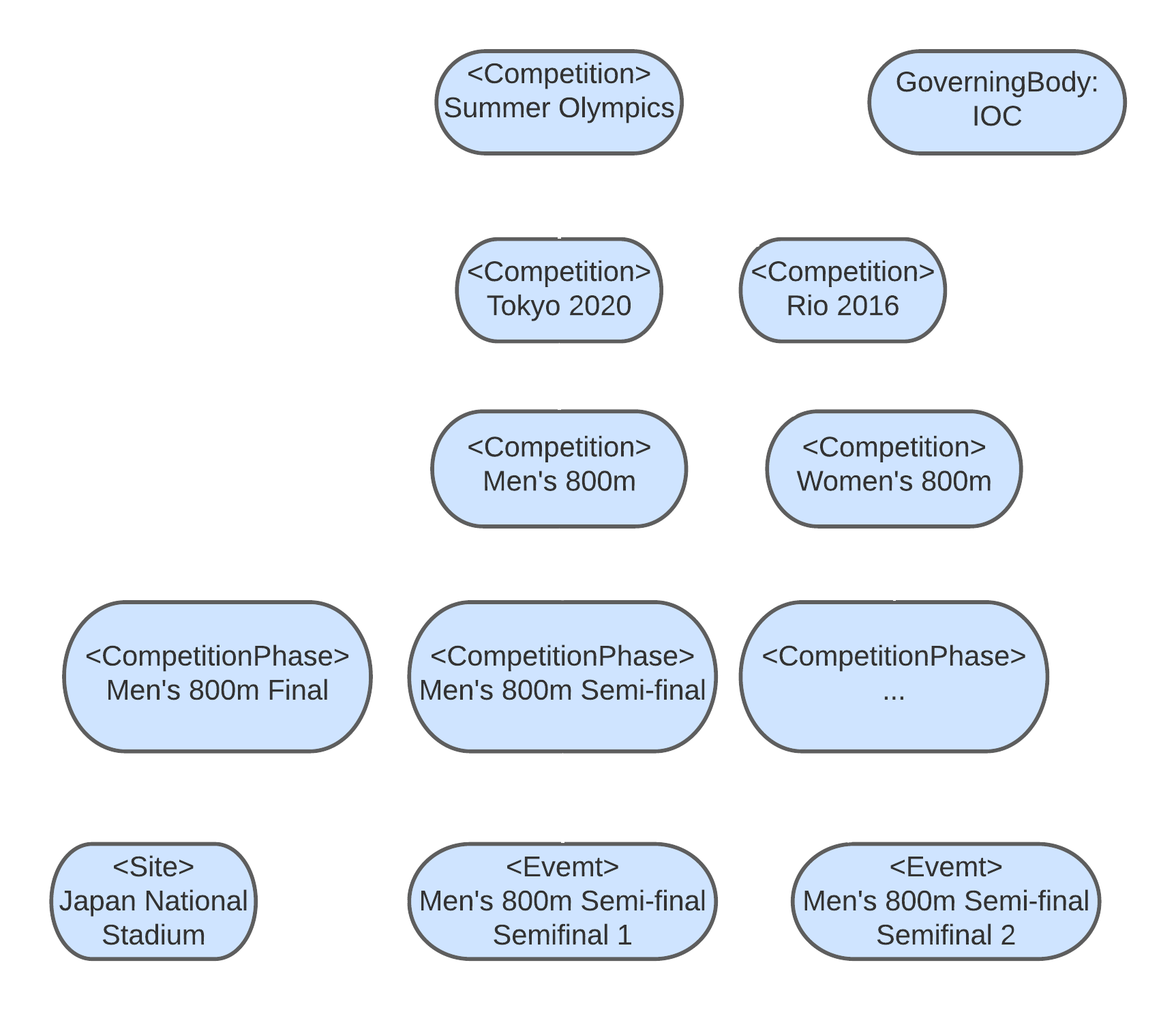Olympic Athletics Example
Here we walk through an example showing how an athletics competition can be represented in IPTC Sport Schema.

First we define the “recurring competition” Summer Olympics (note that these are the same objects that we define in the Olympic Cycling example, so we don’t need to define them again if we have defined them there.)
<http://example.com/GoverningBody/IOC>
rdf:type sport:GoverningBody ;
rdfs:label "International Olympic Committee" .
<http://example.com/Competition/OLYS>
rdf:type sport:Competition ;
rdfs:label "Summer Olympics" ;
sport:competitionType <http://cv.iptc.org/newscodes/spct/recurring-competition> ;
sport:governedBy <http://example.com/GoverningBody/IOC> ;
sport:sport medtop:20000827 .
We now define the instance of Summer Olympics that represents 2020 Tokyo.
<http://example.com/Competition/OLYS2020>
rdf:type sport:Competition ;
rdfs:label "2020 Tokyo Summer Olympics" ;
sport:competitionType <http://cv.iptc.org/newscodes/spct/competition> ;
sport:parent <http://example.com/Competition/OLYS> .
Now the medal event for the Men’s 800 metre race:
<http://example.com/Competition/OLYS2020-ATHM800M>
rdf:type sport:Competition ;
rdfs:label "Men's 800m, 2020 Tokyo" ;
sport:competitionType <http://cv.iptc.org/newscodes/spct/competition> ;
sport:parent <http://example.com/Competition/OLYS2020> ;
sport:sport medtop:20000827 .
And the CompetitionPhase for the final and semi-final “rounds”:
<http://example.com/CompetitionPhase/OLYS2020-ATHM800M-FNL>
rdf:type sport:CompetitionPhase ;
rdfs:label "Men's 800m, Final" ;
sport:competitionPhaseType <http://cv.iptc.org/newscodes/sptournamentphase/final> ;
sport:phaseInCompetition <http://example.com/Competition/OLYS2020-ATHM800M> .
<http://example.com/CompetitionPhase/OLYS2020-ATHM800M-SFNL>
rdf:type sport:CompetitionPhase ;
rdfs:label "Men's 800m, Semi-Final" ;
sport:competitionPhaseType <http://cv.iptc.org/newscodes/sptournamentphase/semi-final> ;
sport:phaseInCompetition <http://example.com/Competition/OLYS2020-ATHM800M> .
And now the race that is called “Semi-Final 1”:
<http://example.com/Event/OLYS2020-ATHM800M-SFNL000100>
rdf:type sport:Event ;
rdfs:label "Semi-final 1" ;
sport:eventInCompetitionPhase <http://example.com/CompetitionPhase/OLYS2020-ATHM800M-SFNL> ;
sport:participation <http://example.com/Participation/OLYS2020-ATHM800M-SFNL000100-PI1373936> , <http://example.com/Participation/OLYS2020-ATHM800M-SFNL000100-PI1453173> , <http://example.com/Participation/OLYS2020-ATHM800M-SFNL000100-PI1402343> , <http://example.com/Participation/OLYS2020-ATHM800M-SFNL000100-PI1393393> , <http://example.com/Participation/OLYS2020-ATHM800M-SFNL000100-PI1307604> , <http://example.com/Participation/OLYS2020-ATHM800M-SFNL000100-PI1553500> , <http://example.com/Participation/OLYS2020-ATHM800M-SFNL000100-PI1421671> , <http://example.com/Participation/OLYS2020-ATHM800M-SFNL000100-PI1324450> ;
sport:startDateTime "2021-08-01T20:26:00+09:00"^^xsd:dateTime .
There would of course be equivalent CompetitionPhase objects representing each round of heats and the final, an Event for each race within those rounds, Athlete objects to represent each athlete participating in those events, and Participation objects to tie them all together.
